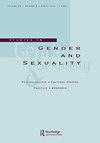Between Fanon and Lacan: Rupturing Spaces for the Return of the Oppressed
Q3 Social Sciences
引用次数: 1
Abstract
ABSTRACT Race is something about which we would rather not speak. Yet it speaks through our everyday enactments structured through our modes of looking. Black Lives Matter and Me Too have shown that something continues to speak in the place where it has been repressed/oppressed. How do we engage with these ruptures in a critical-empathic manner? Can Lacanian psychoanalysis, aligned with a Fanonian sociogeny, offer a dual lens to make sense of intersubjective racialized enactments, to inform possibilities for decolonial engagement? In this article, I explore the unconscious ruptures between myself (a South African Asian-Chinese woman) coming to recognize my Whiteness performed on a go-along and residents of “the township” historically designated “Black.” Blackness and Whiteness are situationally performed, arising in moments of attunement/misrecognition. Reconstituting the oppressive gaze involves a “working through” (within and without) to look toward ourselves for recognition so that we can witness the self/other without rupturing apart.法农与拉康之间:被压迫者回归的断裂空间
种族是我们不愿谈及的话题。然而,它通过我们的日常行为来表达,通过我们的观察模式来表达。“黑人的命也重要”和“我也是”运动表明,某些东西在被压制/压迫的地方仍能继续发声。我们如何以批判共情的方式处理这些裂痕?拉康的精神分析,与法诺的社会成因相一致,能否提供一个双重视角来理解主体间种族化的行为,为非殖民化的参与提供可能性?在这篇文章中,我探索了我自己(一个南非亚裔中国女性)在认识到自己的白人身份时,与历史上被称为“黑人”的“小镇”居民之间无意识的裂痕。黑与白是情境性的表现,在调谐/误认的时刻产生。重建压迫性的凝视需要“通过”(内在和外在)审视自己以获得认可,这样我们就可以在不分裂的情况下见证自我/他人。
本文章由计算机程序翻译,如有差异,请以英文原文为准。
求助全文
约1分钟内获得全文
求助全文
来源期刊

Studies in Gender and Sexuality
Social Sciences-Gender Studies
CiteScore
0.80
自引率
0.00%
发文量
15
期刊介绍:
Beginning in the final two decades of the 20th century, the study of gender and sexuality has been revived from a variety of directions: the traditions of feminist scholarship, postclassical and postmodern psychoanalytic theory, developmental research, and cultural studies have all contributed to renewed fascination with those powerfully formative aspects of subjectivity that fall within the rubric of "gender" and "sexuality." Clinicians, for their part, have returned to gender and sexuality with heightened sensitivity to the role of these constructs in the treatment situation, including the richly variegated ways in which assumptions about gender and sexuality enter into our understandings of "normality" and "pathology."
 求助内容:
求助内容: 应助结果提醒方式:
应助结果提醒方式:


